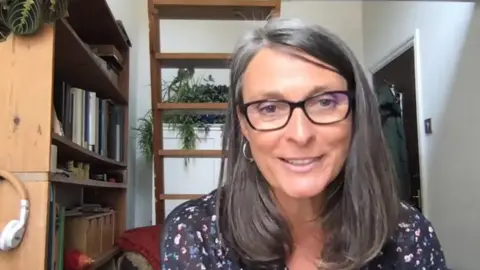Climate change: Wales set to build 20,000 low-carbon social homes
Plans to build 20,000 low-carbon social homes for rent in Wales by 2026 have been set out by the Welsh government's climate change minister.
The hope is to tackle both a housing shortage and the nation's greenhouse gas emissions.
Housing associations say it could lead to thousands of jobs and training opportunities.
But the Welsh government's opponents have said they would have gone further and built more.
All the houses will meet what the government describes as "bold, new quality and environmental standards".
Some could even become miniature power stations, using green technology to generate more electricity than they need. This could then be exported to the national grid to supply other homes.
Spending on social housing for rent in 2021-22 is to be doubled, with ministers committing £250m to the project.
Bills fell drastically
Allyn King and his wife Anne-Marie have seen their monthly gas and electric bills fall from £250 to less than £20 since moving into a low-carbon house in January.
They share the four-bed property at Rhiw Cefn Gwlad - a social housing scheme in Bridgend - with their three children aged between 10 and 17.
"The house is amazing," said Allyn. "We have built up more than £250 in credit during the summer which will be really helpful going into the winter."
 Welsh Government
Welsh GovernmentCai Phillips and his partner Abigail Rees pay a similar amount to run the two-bed house they share with their three-year-old daughter Olivia in Rhiw Cefn Gwlad, which was built by Wales and West Housing.
He said: "The house is so well insulated that the temperature hardly drops below 20 degrees.
"Even on some of the coldest days in winter we didn't need to put the heating on."
'Hugely significant move'
Julie James, Climate Change Minister, said: "We are building at scale to address the supply and demand imbalance, homelessness, the growing second homes crisis, and the climate emergency."
Bethan Proctor, policy and external affairs manager at Community Housing Cymru, said it was a "hugely significant" move.
"It's really going to allow housing associations to begin to decarbonise at pace and scale and will have huge positive impacts."
These could include the creation of 7,000 jobs, 3,000 training opportunities and help produce almost £2bn of economic output in Wales over the next five years, she claimed.

Homelessness charity Shelter Cymru said it welcomed the shift towards building social housing as opposed to so-called "affordable homes", which remained out of reach for many.
"To put it into context, we have approaching 70,000 households in Wales who are on waiting lists seeking social housing," said Shelter's chief executive Ruth Power.
"We also have more than 6,000 people in temporary accommodation and under the right-to-buy policy up to 2016, we lost 139,000 social homes.
"So we absolutely welcome the government's commitment, but that gives you some indication of the scale of the response needed to tackle the housing emergency in Wales."
She also suggested there also needed to be a similar focus on those living in Wales' existing housing stock, which is among "the oldest in the UK".
It is a point also raised by environmentalists, who say the "real challenge" when it comes to cutting greenhouse gas emissions from housing is what to do about the approximately 1.5 million existing homes in Wales.

"We really encourage the Welsh government to come up with a very clear strategy for how to address that older housing stock," said Dr Anna Bullen, innovation lab manager at the Centre for Alternative Technology (CAT) in Machynlleth, Powys.
Modifying green technology and insulation needs to happen "at pace and at scale" because 90% of current homes "will still be in use by 2050", she said.
What did political parties pledge on social housing?
A Welsh government commissioned report in 2018 suggested 21% of the nation's carbon emissions came from housing.
Building 20,000 new low-carbon social homes for rent was a headline policy in Welsh Labour's recent election manifesto, with their opponents pledging higher targets.
The Welsh Conservatives had said it would deliver 100,000 homes over the next decade - 40,000 of which would be social homes.
The party's climate change spokeswoman, Janet Finch-Saunders, said: "The Welsh Labour government has once again set the bar so low it will be almost impossible not to clear it."
Plaid Cymru wanted 30,000 social homes as part of a wider package of 50,000 affordable homes to buy and rent, with the Welsh Lib Dems also pledging 30,000 new social homes.
Paul Allen, a coordinator of CAT's Zero Carbon Britain Project, added that while investment in new low-carbon housing was a positive development, all new-build homes now needed to meet "a pioneering net-zero standard".
